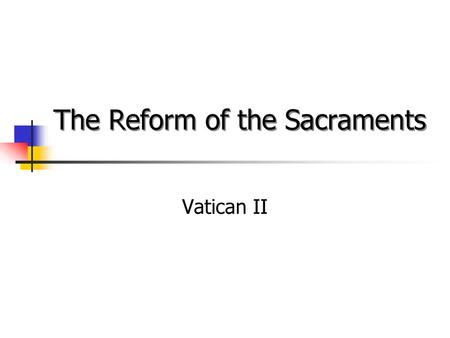Sometimes advocates of Roman Catholicism, researchers, and even professors in British and European cathedrals leave the impression that the Reformation has infiltrated the church and stolen five ancient sacraments while no one was looking. This is completely wrong. It was only in the late 13th century that there was a formal recognition of something like what we now call the Roman Catholic sacramental system. The chalice was capriciously and tyrannically taken from the laity in 1281 at the Council of Lambeth and again at the Council of Constance (1415). While keeping the cup, Rome consented to our Lord giving us the Lord’s Supper in bread and wine. When the Protestant confessional and magisterial churches rejected the five ecclesiastically invented Roman sacraments (confirmation, penance, marriage, ordination and anointing of the sick) and returned the chalice to the laity, they rejected 250 years of novelties gradually developed during medieval times and imposed on Christians at the end of this period, without biblical basis. Protestants return to the Church the two sacraments instituted by Christ. They are also returning the church to the universal practice of the old Christian church.
The two great branches of the Protestant Reformation, the Lutheran and the Reformed, agreed that there are only two sacraments instituted by God: baptism and the Lord’s Supper. They agreed that both are evangelical sacraments, visible representations of the good news preached in Protestant pulpits. They agreed that in the Gospel God declares that sinners are only just because of their gratuity (sola gratia) and that salvation is only received by faith (sola fide). They agreed that the sacraments are a means of grace (media gratiae) by which God strengthens and encourages believers. They agreed that baptism is the sign and seal of Christ to wash away sins by grace alone, to be administered to believers and their children (although they do not agree on its effectiveness), and that the Last Supper is God’s institution to nurture the faith of professing believers. They also agreed that the Roman Catholic doctrine of the memorial and propitiatory sacrifice of Christ at the Last Supper is an idolatrous attack on the finished work of Christ. Yet despite their agreement with some of the more essential aspects of the sacraments, the two great Reformation traditions disagreed on many points.
- Contrary to Lutheran tradition.
- The reformed developed a deep understanding of biblical covenants as a framework in which they understood the sacraments.
- In the early 1520s.
- Ulrico Zuonglio and others concluded that there is only one covenant of grace in the history of redemption.
- Administered in several ways.
- In which God promised to be the God of Abraham and the God of his children.
Pensioners also came to different conclusions about the Lord’s food: they agreed that at dinner believers feed on Christ, but could not accept lutheran confession that the body of Christ was truly present in, with and under the elements. For the reformed, such an understanding does not consider the biblical teaching on christ’s ascension, the promise of the Holy Spirit, and the consubstantiality (of the same essence) of Christ’s humanity with ours.
In the mid-16th century, those in Geneva, Heidelberg and the reformed churches of France, Belgium and the Netherlands overlooked Zurich on the question of the Last Supper. From the early 1540s until his death, John Calvin taught that at the Last Supper, Christ fed the believer in his true body and blood, through faith, through the mysterious operation of the Holy Ghost. The French Confession (1559), the Belgian Confession (1561) and the Heidelberg Catechism (1563) confess this high doctrine.
The recovery of ancient Christian doctrine and the practice of the sacraments was so essential to the Reformation that the reformed churches in Europe and the British Isles spoke of the correct use of the sacraments as “marks” of the royal church. In article twenty-nine of the Belgian Confession, the French and Dutch-speaking churches confessed that there are three marks of a true Church: the “pure preaching of the Gospel”, the “pure administration of the sacraments”. And “the use of ecclesiastical discipline. ” The term “pure administration of the sacraments” was a succinct way of rejecting the Anabaptists and Rome.
During the celebration of the Reformation in 2017, tour guides can be heard saying that the reformers have removed the sacraments of the church, nothing further from the truth, the Reformation was not vandalism, but the recovery of a pearl of great value: the two sacraments instituted by our Savior with the good news they mean and seal.

